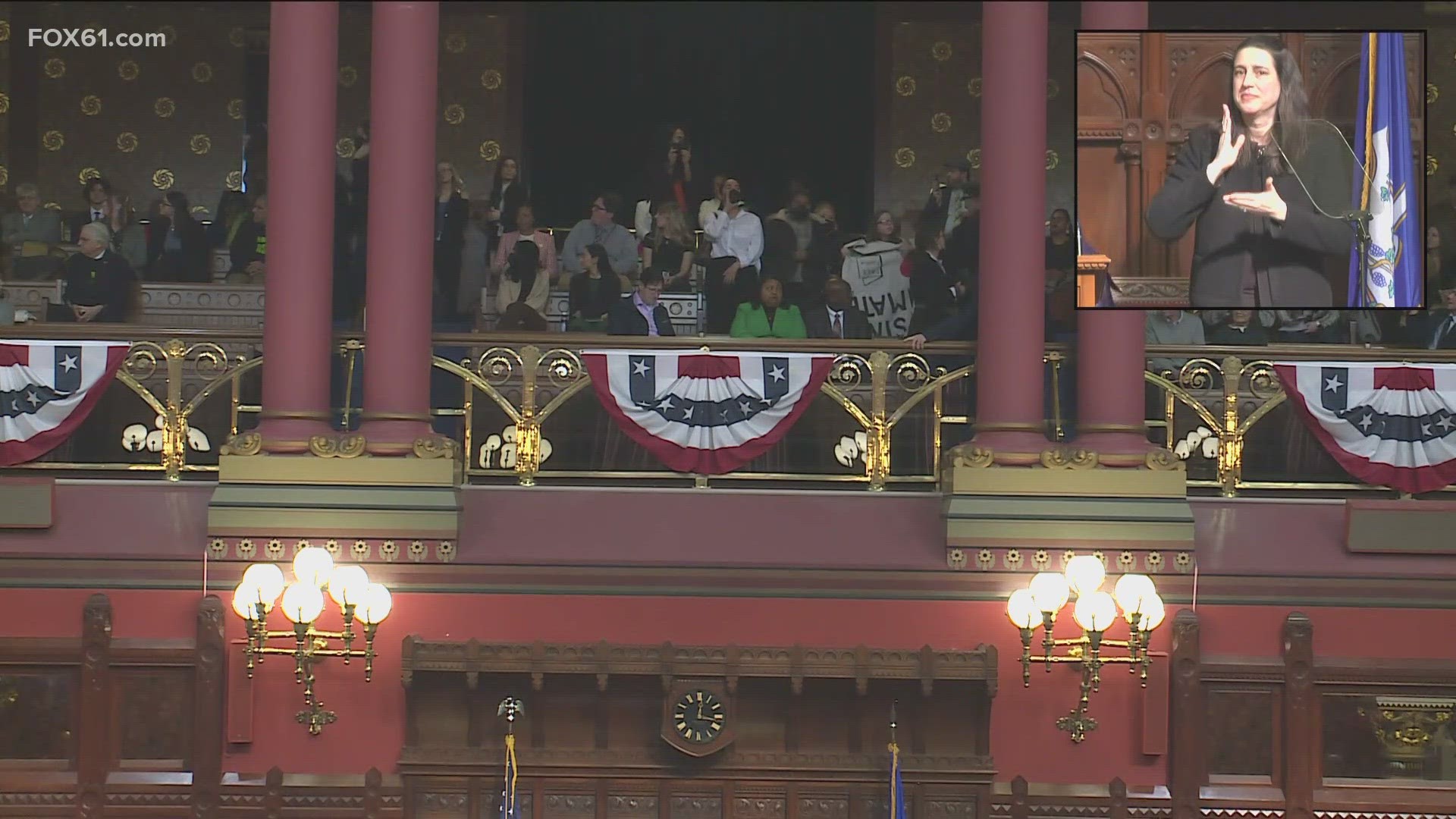HARTFORD, Conn. — Minutes into Gov. Ned Lamont's 2024 State of the State address, protestors inside began shouting "ceasefire now," referring to the current war between Israel and Hamas in Gaza.
Lamont temporarily stepped away from the podium while the protestors were escorted out of the chamber.
"I'll say on a personal note; I've done – been to – a few anti-war demonstrations as well in my day, and whatever the justice of your cause I think you do a disservice when you're rude and disrespectful in a room like this, disrespecting the people like this, and disrespecting the audience," Lamont said once he stepped back up to the podium before continuing his address. His remarks earned him a standing ovation from most in the chamber.
Outside the state Capitol, the group of people marched and chanted, holding a banner that read “Connecticut Stop Arming Israel.” Connecticut is home to multiple gun manufacturers.
No one was arrested or issued a summons to court, State Capitol Police Lt. Gregory Wimble said.


Lamont gave an upbeat assessment of the state and its finances on Wednesday, countering calls from some of his fellow Democrats to raise taxes on the wealthy so more money can be spent on higher education and social services, as well as to help people struggling to make ends meet.
The two-term governor, a multimillionaire himself, lauded the fact that the two-year $51-billion budget passed last year on a bipartisan vote “is still in the black” unlike most of the Connecticut's peer states.
“And people are noticing,” Lamont told a joint session of the Democratic-controlled General Assembly on the opening day of the short, 13-week legislative session. “Unlike our neighboring states, which are losing population, Connecticut has gained population over the last few years.”
Lamont on Wednesday also released his proposed adjustments to the second year of the two-year budget. Despite calls to the contrary from progressive Democrats, the governor's plan abides by the state's “fiscal guardrails,” bipartisan financial restraints imposed in 2017 that have been credited with bringing financial stability to the state.
Some top Democrats, including Senate President Pro Tempore Martin Looney, have suggested the caps on spending and borrowing should be adjusted to allow for more spending in key areas.
While Lamont faces pushback from the more liberal wing of his party, the top Republican leader of the state Senate praised the governor for still embracing the budgetary caps, calling it “music to our ears.”
Senate Minority Leader Kevin Kelly, a Republican from Stratford, said budgets are about priorities and if the Democrats want to spend more money on social services and other programs, then they need to reprioritize spending.
“The guardrails have worked fabulously well,” he said. “They’ve resulted in balanced budgets. They resulted in a rainy day fund. They’ve resulted in paying down debt.”
Lamont's budget attempts to address some of the concerns of his fellow Democrats. He said it includes the “largest state grants ever” for Connecticut's state college and the University of Connecticut. There is also a combination of state and federal COVID funds set aside to continue providing universal free breakfast and reduce-price meal subsidies for school lunches to students.
Lamont's spending proposal also sets aside an additional $43.3 million, on top of the $68.8 million already in the budget, for various early childhood initiatives. He has also proposed eliminating state licensing fees for various occupations, including nurses and home child care workers. And Lamont's plan includes additional funding to provide no-cost legal representation to income-eligible tenants facing eviction.
The governor stressed, however, that more work needs to be done to make housing in Connecticut affordable, noting that state funding is doubled for various housing initiatives in the two-year spending plan.
“We have too many people who cannot find a place to live,” Lamont said. “It is not available or it is not affordable.”
The Associated Press contributed to this report.
---
Earlier story...
Lawmakers face a packed agenda and will work to prioritize which issues to pass legislation on for this short session. In the mix is everything from education, workforce development, and even electric vehicle regulations.
Another issue Connecticut lawmakers would likely want to take is the state's housing crisis. Proposals are already focusing on development since supply is far below demand. Lawmakers are discussing changes to the housing voucher system, among other things, to potentially help residents.
But, they say the real challenge comes down to incentivizing affordable housing since zoning is typically left up to community boards and commissions.
"It becomes a supply and demand issue where we haven't built what we need to, we haven't acknowledged the changes in population we're seeing in the state of Connecticut," said Kara Capone, the CEO of CT Housing Advocates. "We need to figure out, policy-wise, ways to invest in our communities so that we respect what makes our towns unique and special but also invite families and individuals who otherwise couldn't afford to."
Another thing at the top of the agenda is making adjustments to the $26 billion state budget approved for the fiscal year that starts this July.
One of the things to watch for in the budget talks is the debate over the state's fiscal guardrails. That includes spending caps and savings requirements.
"Before the guardrails, sometimes you had 'boom' years, and you had 'busy' years," said Lamont on Tuesday. "You couldn't count on it. Six years of consistent increases in our key social services -- I think that's something to be proud of."
Some lawmakers and advocacy groups are calling for more flexibility in spending for things like higher education and social services as the state has strong revenues.
"There's a lot of sense, 'Oh my gosh, you're cutting the heck out of this program or that program,' you know, the University of Connecticut or [...] daycare are getting the biggest grants in history," Lamont said.
Many programs say even with some funding increases, it's not enough to cover operating costs and gaps caused by the end of the federal, pandemic-era funding.
Despite the call for more funding, the state's strict spending cap stands in the way.
"Could we be doing more? Yes, but what you want is consistency, and that's what we've been able to accomplish," Lamont said.
Lamont and Republican state leaders want the legislature to stick to the fiscal guardrails, while Democratic leadership has signaled an openness to finding some flexibility.
"Look at all our neighboring states. They're cutting funding for programs," Lamont said. "We're arguing about how much to increase our programming. I'm proud of where Connecticut is."
---
Jennifer Glatz is a digital content producer at FOX61 News. She can be reached at jglatz@fox61.com.
Angelo Bavaro is an anchor and reporter at FOX61 News. He can be reached at abavaro@fox61.com. Follow him on Facebook and X.
Emma Wulfhorst is a political reporter for FOX61 News. She can be reached at ewulfhorst@fox61.com. Follow her on Facebook, X and Instagram.
HERE ARE MORE WAYS TO GET FOX61 NEWS
Download the FOX61 News APP
iTunes: Click here to download
Google Play: Click here to download
Stream Live on ROKU: Add the channel from the ROKU store or by searching FOX61.
Steam Live on FIRE TV: Search ‘FOX61’ and click ‘Get’ to download.

